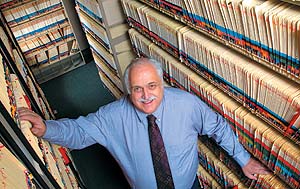|
The Georgia Center for Cancer Statistics (GCCS) at the Rollins School of Public Health (RSPH) is the operations hub for the statewide registry and the Surveillance, Epidemiology, & End Results (SEER) registry in metro Atlanta. While the Atlanta SEER has always made NAACCR’s gold grade, the state registry had not achieved the award. What made the difference this year? The director of GCCS, John Young, points to a new “hammer” in the law. “Before, the state had no authority over hospitals that failed to comply with requests to submit cancer data to the registry. Now, if a hospital hasn’t reported in at least two out of three months, the state has the power to withhold its Medicaid funding. That’s a powerful incentive.” Established in 1973 by NCI, SEER is a primary source of cancer statistics in the United States. Leading public health organizations including NCI, CDC, and the American Cancer Society use SEER data to analyze trends in cancer incidence and mortality, develop cancer control programs, measure the impact of prevention programs, and guide health policy decisions. Atlanta SEER data is particularly important for tracking long-term cancer trends in a large African-American population. Connections with partners at the local, state, and national level are vital to the SEER program. Young’s group meets regularly with epidemiologists in the Georgia Department of Human Resources Division of Public Health, the Georgia Cancer Coalition, the southeast division of the American Cancer Society, and the local chapter of the American College of Surgeons. These partners work together on broad-ranging goals such as setting cancer goals for the year 2010 as well as the nitty-gritty details of how to make data collection more efficient. For example, NCI has called for data to be collected on all benign brain tumors beginning in 2004. The state and GCCS are working together to solve the technical aspects of making this change, exploring whether the law must be modified or if a declaration by the state’s public health director is sufficient. Close local collaborations insure that new statistics aren’t numbers buried in a registry archive but instead are active tools for epi studies and policy decisions. Young recently uncovered an alarming glitch in the SEER data, a discovery that has impacted not only the national cancer portrait but also the particular picture of cancer in Georgia. Based on 1999 census figures, breast cancer incidence rates were 67% higher for African Americans in metropolitan Atlanta than for whites, reversing a trend that white women historically have had higher rates for breast cancer. At first, Young thought he had uncovered a “startling epidemiologic finding,” the beginning of a trend. However, when he began to look at the data at the county level, the analysis failed to make sense. On close study, he found an explanation: the US Census had drastically underestimated metro Atlanta’s total African-American population in the late 1990s. The most recent census didn’t account for a large African-American migration into the metro Atlanta area over the past decade, and those numbers in turn drastically skewed the calculation of cancer risk. The census error made the cancer disparity between blacks and whites in Atlanta look much greater than it actually is. Young’s finding showed that while racial disparities are still substantial for many cancers in the Atlanta area, they are now believed to be no larger than those elsewhere in the country. Recently, NCI renewed the Atlanta SEER program for seven years. The group’s most recent application was accompanied by letters of support from the American Cancer Society’s national office and southeast division, the RSPH, and the Georgia Division of Public Health, which called the data an “invaluable resource. We are pleased with the many ways our organizations have worked together,” wrote Kenneth Powell for the division, “to assure the collection of complete and accurate data, to assure accurate interpretation of the data, to provide access to the data by others, and to use the data ourselves on a regular basis. We look forward to continued collaboration.” By Rhonda Mullen
G-Training in Progress | Resisting Superbugs | Foege Fellows | Profile: County Connections Class Notes & Alumni News | Rollins School of Public Health
Copyright © Emory University, 2003. All Rights
Reserved. |
